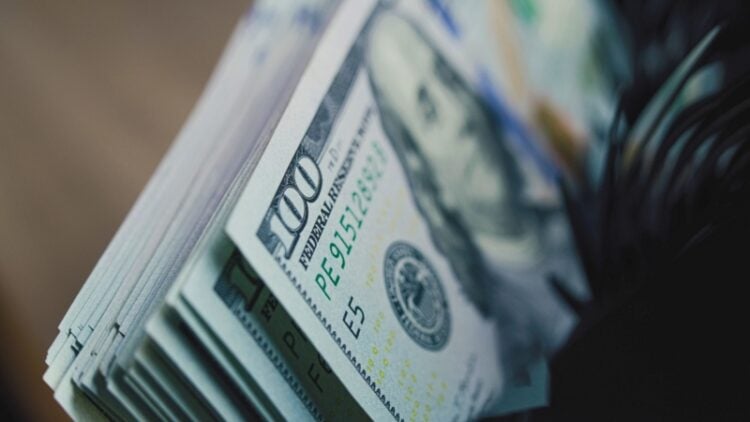Publisher: Maaal International Media Company
License: 465734
Dollar gains as Trump reignites trade concerns
The dollar retraced earlier losses against the euro on Friday after U.S. President Donald Trump said the United States was ending trade talks with Canada and that he would consider bombing Iran again, denting risk appetite and sending stocks lower, Reuters reported.
“Taken together, both messages highlight how erratic Trump is and that any assumptions built into markets can be instantly undermined,” said Adam Button, chief currency analyst at ForexLive.
“The knee-jerk has been to buy the U.S. dollar but once the smoke clears, that’s likely to retrace. The trade war has been a dollar drag all year,” Button said.
اقرأ المزيد
U.S. Treasury Secretary Scott Bessent said earlier on Friday the Trump administration’s various trade deals with other countries could be done by the Sept. 1 Labor Day holiday.
The Canadian dollar extended losses on the day, however, after Trump said the U.S. is immediately ending trade talks with Canada in response to the country’s digital services tax on technology companies. It was last down 0.5% versus the greenback at C$1.37 per dollar.
Trump also sharply criticized Iran’s Supreme Leader Ali Khamenei, dropped plans to lift sanctions on Iran and said he would consider bombing Iran again if Tehran is enriching uranium to worrisome levels.
The dollar dropped to a three-and-a-half-year low against the euro earlier on Friday as traders bet that the Federal Reserve will cut rates more times and possibly sooner than previously expected as some U.S. data points to a weakening economy.
A report on Friday showed that U.S. consumer spending unexpectedly fell in May as the boost from the pre-emptive buying of goods like motor vehicles ahead of tariffs faded, while monthly inflation increases remained moderate.
A weekly jobs report on Thursday showed that continuing unemployment claims rose to the highest level since November 2021 while gross domestic product figures for the first quarter reflected a sharp downgrade to consumer spending.
“Some of the data that we’ve had has not been particularly good over the last few days,” said Lou Brien, strategist at DRW Trading in Chicago.
Fed Chair Jerome Powell’s testimony to U.S. Congress this week was interpreted as dovish after he noted that rate cuts are likely if inflation doesn’t increase this summer as he expects.
Reports that U.S. President Donald Trump could also appoint a replacement for Powell in the coming months have added to dollar weakness.
The new Fed chair is expected to be more dovish and an early appointment could undermine Powell’s influence by acting as a shadow chair before Powell’s term ends in May.
Trump has not decided on Powell’s replacement and a decision isn’t imminent, a person familiar with the White House’s deliberations said on Thursday.
Fed rate cuts would reduce the interest rate advantage of the dollar relative to peers.
Traders are pricing in 65 basis points of cuts by year end, up from 46 basis points a week ago.
The dollar index was little changed on the day at 97.36 and is on pace for a 1.40% weekly decline, the worst since May 19.
The euro was last up 0.05% at $1.1705 and reached $1.1754, the highest since September 2021. It is on track for a 1.57% weekly gain, the best since May 19.
Sterling weakened 0.19% to $1.3701 and was on track for a 1.85% weekly gain, its best week since May 19. The dollar fell 0.06% to 0.8 Swiss franc and is heading for a 2.26% weekly drop, the largest since April 7.
Top U.S. Republicans also confronted a yawning budget hole in their sprawling tax-cut and spending bill on Friday, signaling that they could miss Trump’s July 4 deadline as they rewrite dozens of elements rejected by a nonpartisan referee.
The long-term outlook for the dollar is seen as challenging as foreign investors reevaluate the “American exceptionalism” that has drawn investment to the country.
Brien said that the impact of the Biden administration’s policies was also still weighing on the currency.
Former President Joe Biden cut off Russia’s access to the U.S. dollar, froze its assets and imposed sanctions following the country’s invasion of Ukraine in 2022, which analysts say led other countries to accelerate shifts away from U.S. dollar reliance.
“The Biden administration weaponized the dollar as it really had not been weaponized before,” Brien said. “That aspect of it is still in the back of people’s heads.”
Against the yen, the dollar strengthened 0.19% to 144.65. It is headed for a 0.94% weekly decline against the Japanese currency, the largest since May 19.
Core consumer inflation in Japan’s capital slowed sharply in June due to temporary cuts to utility bills but stayed well above the central bank’s 2% target, keeping alive market expectations for further interest rate hikes.
In cryptocurrencies, bitcoin fell 0.86% to $106,879.








